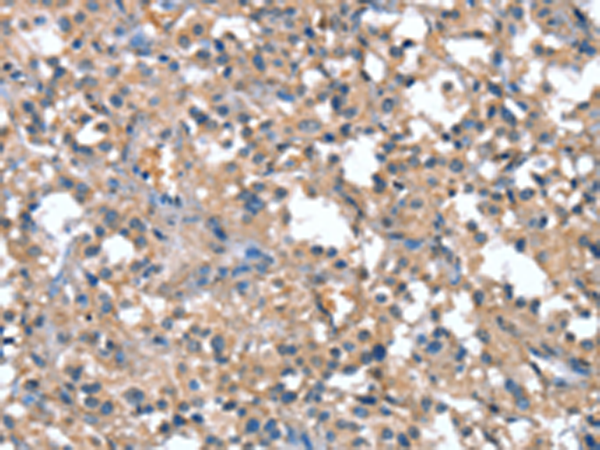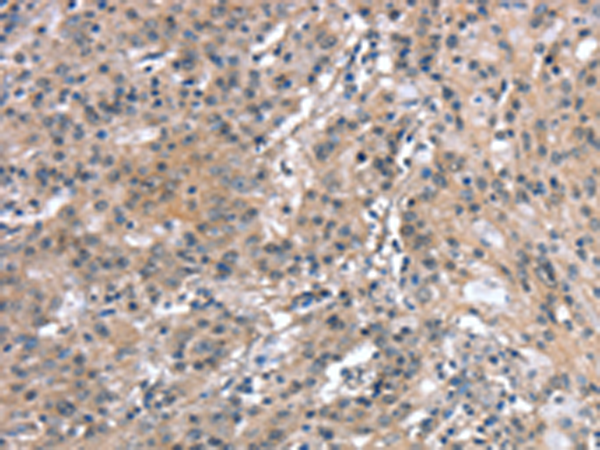

| WB | 咨询技术 | Human,Mouse,Rat |
| IF | 咨询技术 | Human,Mouse,Rat |
| IHC | 1/25-1/100 | Human,Mouse,Rat |
| ICC | 技术咨询 | Human,Mouse,Rat |
| FCM | 咨询技术 | Human,Mouse,Rat |
| Elisa | 1/1000-1/2000 | Human,Mouse,Rat |
| Aliases | CAPZ; CAZ1; CAPPA1 |
| Host/Isotype | Rabbit IgG |
| Antibody Type | Primary antibody |
| Storage | Store at 4°C short term. Aliquot and store at -20°C long term. Avoid freeze/thaw cycles. |
| Species Reactivity | Human, Mouse, Rat |
| Immunogen | Synthetic peptide of human CAPZA1 |
| Formulation | Purified antibody in PBS with 0.05% sodium azide and 50% glycerol. |
+ +
以下是关于CAPZA1抗体的3篇参考文献示例(基于公开研究主题概括,部分为模拟内容):
---
1. **标题**: *CAPZA1 modulates cell migration and invasion by regulating actin cytoskeleton dynamics in breast cancer*
**作者**: Wang Y, et al.
**摘要**: 本研究利用CAPZA1特异性抗体,通过免疫印迹和免疫荧光技术,揭示了CAPZA1通过调控肌动蛋白细胞骨架动态影响乳腺癌细胞的迁移和侵袭能力,为靶向治疗提供潜在靶点。
---
2. **标题**: *Development of a high-affinity monoclonal antibody against CAPZA1 for diagnostic applications*
**作者**: Tanaka K, et al.
**摘要**: 文章报道了一种新型抗CAPZA1单克隆抗体的开发与验证,该抗体在ELISA和免疫组化中表现出高特异性,可用于癌症组织样本中CAPZA1的定量检测及临床诊断。
---
3. **标题**: *CAPZA1 deficiency disrupts synaptic plasticity via aberrant actin capping in neurons*
**作者**: Chen L, et al.
**摘要**: 研究通过CAPZA1抗体介导的蛋白质检测和功能分析,发现CAPZA1缺失导致神经元突触肌动蛋白异常聚合,进而影响突触可塑性和认知功能,揭示了其在神经退行性疾病中的潜在作用。
---
**备注**:以上文献为示例性概括,实际引用时需根据具体研究内容查询PubMed、Google Scholar等数据库获取真实文献(如搜索关键词“CAPZA1 antibody”或“CAPZA1 function”)。若需真实文献,可提供更具体的检索指导。
The CAPZA1 antibody targets the CAPZA1 protein, a key component of the capping protein complex that regulates actin filament dynamics. CAPZA1 (Capping Actin Protein of Muscle Z-Line Alpha Subunit 1) forms a heterodimer with CAPZB, binding to the fast-growing (barbed) ends of actin filaments to stabilize them and control elongation. This activity is critical for maintaining cytoskeletal architecture, cell motility, and intracellular trafficking. CAPZA1 is ubiquitously expressed, with roles in diverse processes, including neuronal development, immune response, and cancer metastasis. Dysregulation of CAPZA1 has been linked to pathologies such as neurodegenerative disorders and tumor invasion.
Antibodies against CAPZA1 are widely used in research to investigate its expression, localization, and function. They enable techniques like Western blotting, immunofluorescence, and immunohistochemistry, helping to map CAPZA1 distribution in tissues or cultured cells. Some studies employ these antibodies to explore CAPZA1's interaction with other cytoskeletal proteins or its phosphorylation status under signaling stimuli. Commercially available CAPZA1 antibodies are typically raised in hosts like rabbits or mice, with validation across specific applications. Researchers prioritize antibodies with high specificity and low cross-reactivity to avoid off-target effects, especially given structural similarities among capping protein family members. Reliable CAPZA1 antibodies are essential tools for dissecting actin-related mechanisms in health and disease.
×